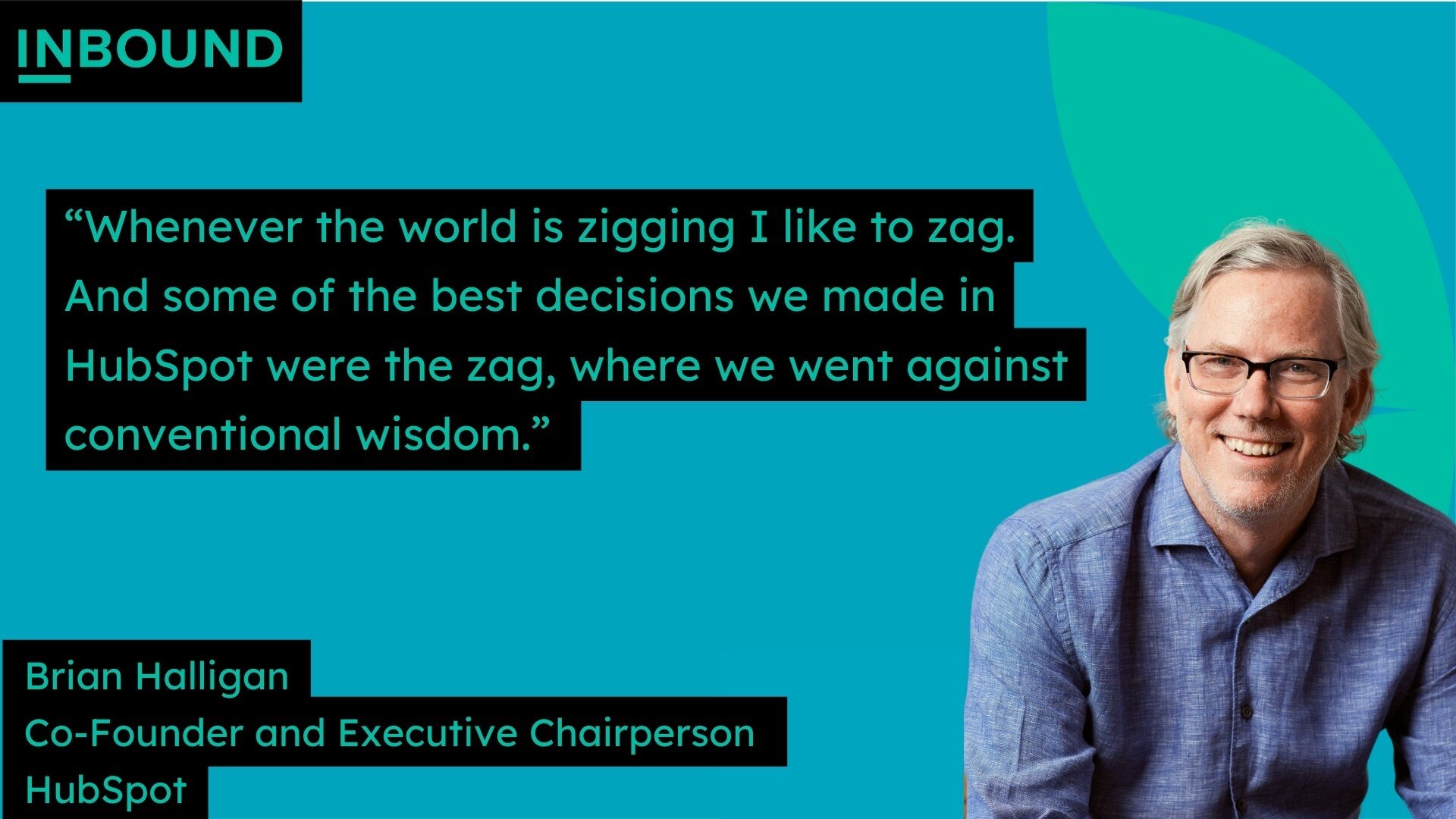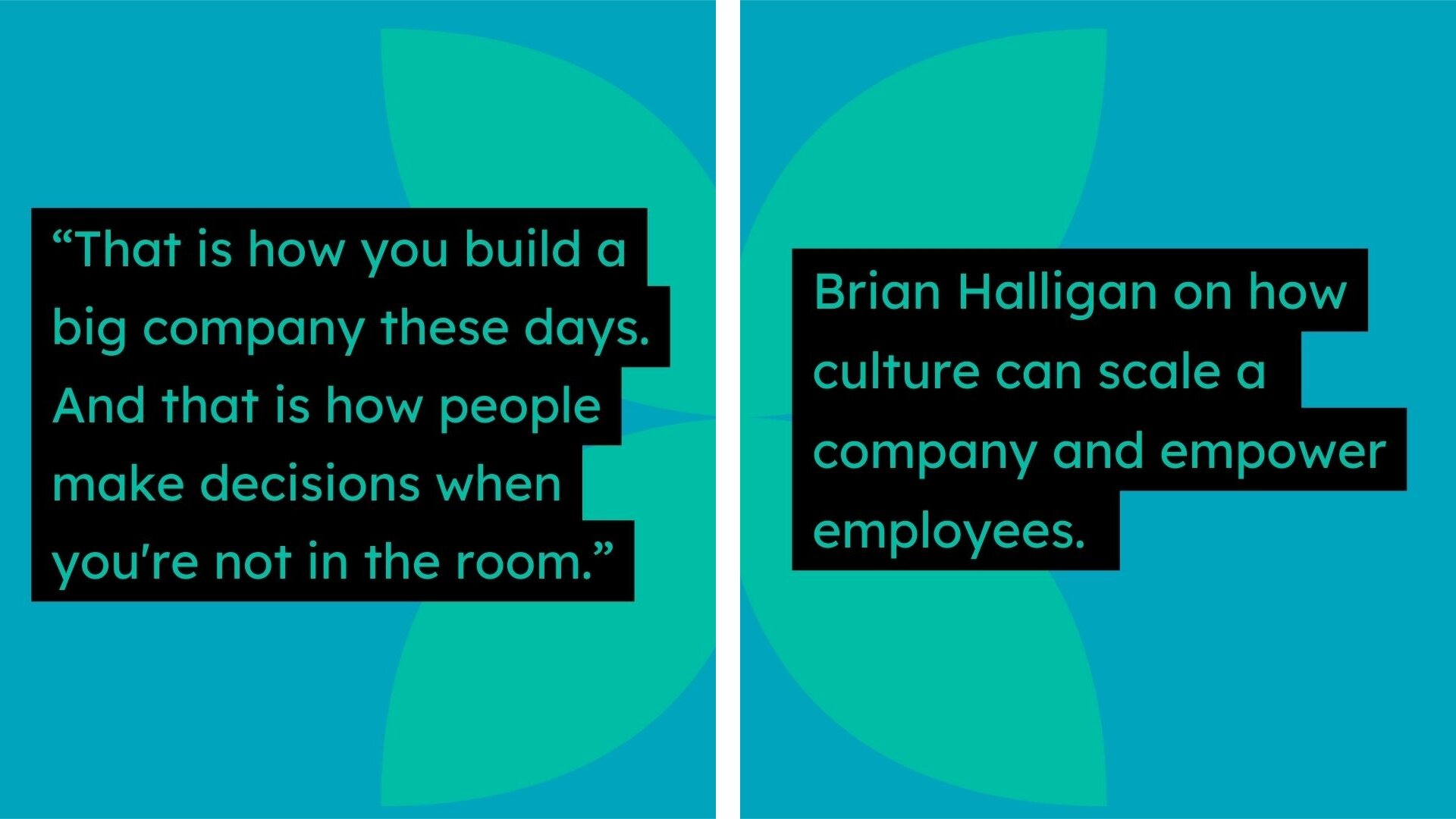Inbound
January 21, 2026Everything You Need to Know About INBOUND 2026 Speaker Opportunities
Announcement
Hotel booking(opens in a new tab) opens Feb. 10 for attendees; want access to the best hotels at the best rates? Register now and be first in line.

A self-proclaimed “Learn-it-All,” devoted Dead Head, and co-founder and executive chairperson of HubSpot, Brian Halligan wears many hats. From building HubSpot, he’s learned plenty of leadership lessons — from challenging business norms to creating a culture of happy HubSpot employees, here are some key takeaways for business owners and entrepreneurs on how to succeed.
TAKE AN UNCONVENTIONAL APPROACH
Sometimes, it takes a leader to swim against the current to find success. As an entrepreneur, what is something that you are steadfastly sure about that everyone else thinks is wrong? And are you absolutely certain that you’re right? Once you find it, take a strong stance. Or, as Halligan says, zag when everyone else is zigging.
HubSpot betting on small and medium-sized businesses when investors were interested in the opposite? Zag. Shifting a burgeoning marketing application company into a CRM platform against steep competition? Zag. Taking that CRM platform and building out a homegrown integrated system for it instead of acquiring other businesses as a solution? Zag.
Halligan has helped lead HubSpot through some pretty impressive zags that have ultimately paid off. How? By thinking unconventionally, digging in, and scaling on those ideas.

PREPARE TO EVOLVE AS YOU GROW AND SCALE
As an entrepreneur, business owner, or leader, don’t be afraid to recalibrate as your business progresses. Case in point: HubSpot’s changing obsessions (as Halligan puts it). At first, he notes the company was obsessed with the relationship between the sales organization and a prospect and really fine-tuning the process of converting those prospects to customers. Over time, that naturally evolved as he and the team spoke to customers and learned that the decision criteria had transformed: word of mouth was quickly becoming a top reason for user adoption versus the sales relationship.
“So we flipped to being obsessed instead of between sales and the prospect and that conversion rate to how do we turn a customer into a delighted customer,” Halligan says. With a change in obsession, came a change in metrics: number of leads gave way to customer net promoter scores. The result? A shift in the company’s center of gravity with budgets and decisions that weighed more heavily into product and engineering.
Sometimes, big bets and major changes need to happen in order to align your businesses’ growth with your customers’ needs. “As you get bigger, you need to make these pivots and these bets. You can't just sit on your laurels,” Halligan emphasizes.
The bottom line? Listen to your customers and be ready to adjust in order to meet them where they’re at.
BUILD YOUR PRODUCT, BUT DON’T FORGET ABOUT THE CULTURE
How do you shape culture as a product? For a company that was initially built around quantifiable metrics, at first, HubSpot culture wasn't a big focus. That all changed after Halligan joined a CEO group and the topic was at the forefront of a peer meeting. There, he learned that culture is how you can scale your company and it’s how people make decisions when you’re not in the room as a leader.
After sharing these key takeaways with HubSpot co-founder Dharmesh Shah, a culture code was created: the net promoter score was introduced as an employee metric in addition to being a customer metric. Now, HubSpot was tracking the happiness (or lack thereof) of employees. From that point on, Halligan notes HubSpot realized it had two products: the product sold to customers and the culture of the company.
Both are equally important to HubSpot’s success. “If that product is unique and valuable, it pulls customers in like a magnet and retains them,” he says. “And our second product is our culture. If it's unique and valuable, it pulls employees in and retains them,” Halligan adds. While startups and companies experiencing growth may focus more heavily on product, it’s important to place an equal emphasis internally on your team and the culture being built within your organization.

Entrepreneurs are faced with constant challenges and important decisions as they work to build and scale their businesses. From decision-making that goes against the grain, to cultivating a culture of valued employees, you can take proactive steps in growing a remarkable organization.